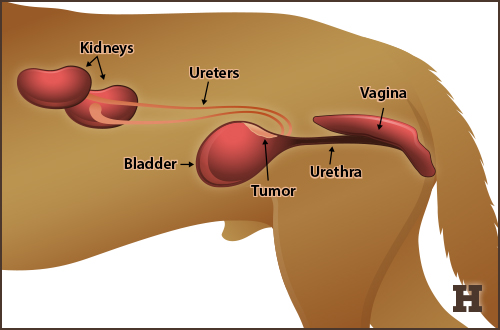
Similar to other types of cancer adenocarcinoma of the pancreas usually affects older dogs more than eight years. Unfortunately it could be pancreatic cancer.

Without a functioning pancreas dogs can become weak and suffer neurological problems.
Does my dog have pancreatic cancer. Thankfully pancreatic cancer is relatively rare in dogs but the most common types are adenocarcinomas and insulinomas. That doesnt mean any tumor found in the pancreas is cancerous - there are non-cancerous or benign tumors that are sometimes found in the pancreas called adenomas but unfortunately these occur a lot less commonly. Pancreatic cancer in dogs is either Primary or Secondary.
Primary tumors are when the neoplasm tumor develop in the pancreas and secondary tumors are when the cancer has developed in another organ and then spread metastasized to the Pancreas. If Your Dog Has Cancer You NEED This Book. Benign and malignant tumors in dogs.
Canine pancreatic cancer is rare but the cancerous tumours adenocarcinomas are aggressive and malignant. Like other carcinomas it grows rapidly and metastasizes to other parts and organs of the body. In most dogs metastasis is found at the time of diagnosis thus.
Causes of Pancreatic Cancer Insulinoma in Dogs Insulinoma is caused by cancerous growth on the pancreas. The presence of these tumors cause the dogs insulin levels to increase in turn decreasing the glucose in their bloodstream. Without a functioning pancreas dogs can become weak and suffer neurological problems.
Therefore it is difficult to tell if a dog showing the symptoms has pancreatic cancer or other benign pancreatic disease. For example a dog with pancreatic cancer may show signs such as. Hyperglycemia elevated blood sugar level Ascites fluid accumulation in the peritoneal cavity Jaundice the skin and mucous membranes may.
Unfortunately it could be pancreatic cancer. We dont usually treat pancreatitis medically. We treat it nutritionally with diet supplements and homeopathic remedies.
A really good sonographer could help with a more definitive diagnosis so ask around and try to find the best. If youre anywhere on the east coast I would highly recommend Victor Randano at Multi Imaging in Groton or Ithaca New. Pancreatic cancer is often hard to detect until the condition is at advanced stages which is why the prognosis for dogs with this type of cancer is usually dire.
Treatment for pancreatic cancers. Now that you understand how different each situation can be based on the dog in question lets dive into the common types of cancer in dogs. Common Types of Cancer in Dogs.
While there is a long list of cancers that can impact our furry friends there are some common ones that are seen often in the veterinary office. Some of the common types of cancer in dogs include. Osteosarcoma Bone Cancer Melanoma.
Pancreatic cancer usually strikes older dogs aged 9 to 10 although younger mature dogs can contract it too and some breeds appear more susceptible than others says. Similar to other types of cancer adenocarcinoma of the pancreas usually affects older dogs more than eight years. It can occur in any breed or gender of dog but older female dogs and Airedale terriers have been found to be at higher risk than others.
Pancreatitis cancer is very rare in dogs. However if your dog shows any symptoms such as confusion loss of appetite and sleep weakness. It is recommended to visit your vet.
Since the spread will have already taken place once it is diagnosed it is important to follow the medication or surgery whatever advised by the vet. There are various ways to treat cancer. However sometimes a combination of two.
Dogs with pancreatic cancer oftentimes have a difficult time eating sufficient amounts of food. You may notice that your pets overall appetite has diminished as a result of his tumorous growth. As this happens your pet will lose out on nourishment that he would otherwise be eating and his weight will gradually and consistently go down.
Oftentimes pet owners do not recognize weight loss in. The pancreas has many important functions including aiding in the digestion of the food your dog eats and secreting insulin which helps regulate your dogs glucose sugar levels. An insulinoma is a tumor of the pancreas that affects the regulation of your dogs sugar levels causing hypoglycemia also referred to as low blood sugar.
Pancreatic adenocarcinomas are the most common malignant tumor of the exocrine pancreas in dogs. A few other types of cancer have also been reported in the pancreas. A diagnosis may be made based on a combination of blood tests x-rays ultrasonography biopsy or exploratory surgery as appropriate.
Primary pancreatic tumors are rare in dogs and cats. Exocrine tumors include adenomas and adenocarcinomas and endocrine tumors include insulinomas gastrinomas and glucagonomas. Insulinomas are the most common type of pancreatic tumor followed by adenocarcinomas.
Both tumors are more common in dogs than cats. Large breed dogs and Siamese cats may be predisposed. In recent times dogs have been introduced to a processed diet often containing grains.
As a result pancreatic conditions such as pancreatitis pancreatic cancer canine diabetes and stomach cancer in dogshave all been on the rise. Main Causes for Pancreatic Cancer in Dogs The causes for canine pancreatic cancer are not well understood. Diagnosis of Pancreatic Cancer in Dogs.
The pancreas is the organ in the body whose job it is to produce insulin the hormone that regulates blood glucose levels in addition to other hormones and.